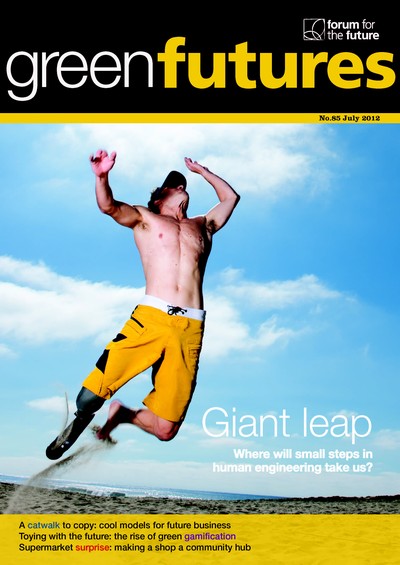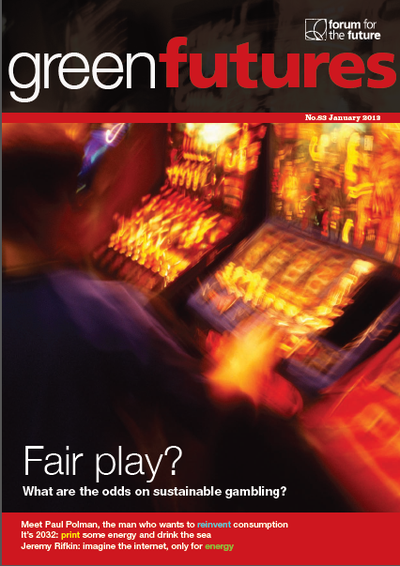Green Futures i — January 2012, #83

Green Futures
Green Futures is the leading magazine on environmental solutions and sustainable futures. Founded by Jonathon Porritt in 1996, it is published by Forum for the Future.
- 199 (51)
- United Kingdom
- Four issues a year
- First issue 1996
“Hope and optimism – in spite of present difficulties.”
This old African saying, made famous by Namibian artist John Muafangejo, seems pretty apt just now. Even those of us who resolutely see the glass as half full only have to glance at the news to wonder if, after all, we’re pretty much down to the dregs. Economies in atrophy… a damp squib at Durban… not to mention the wilful abdication of anything approaching scientific literacy by swathes of the mainstream media. You’d be forgiven for imagining there’s some perverse law of journalism in operation: one which dictates that informed coverage of climate change shrinks in inverse proportion to mounting evidence that, yes: it’s here, it’s happening, and it’s our fault.
(Incidentally, if you’re looking for a quick and dirty response to your friendly neighbourhood climate sceptic, try this: “Every single one of the world’s major national scientific academies continues to endorse the consensus on anthropogenic climate change. So if you don’t agree with them, is it because you know something they don’t? Or you think they’re all conspirators in some collective climategate scam? Because it has to be one or the other. Or both.”)
But, as usual, I digress. Faced with all these gloomy symptoms, you might imagine that any serious business will have shoved sustainability firmly onto the back burner. If so, this issue should be something of an antidote.
Take our interview with Paul Polman, CEO of Unilever [p20], where he explains just why he’s committed the company to green goals that put most governments to shame with their scale and ambition. (And, yes, I know Pot Noodle is rarely seen as an icon of sustainability, but he manages to come up with an answer to that, too.) The contrast between his rock solid commitment on the one hand, and the wavering signals sent out by the British Government on the other, couldn’t be more striking.
Or take gambling: hardly a green standard bearer for sustainability, you’d have thought. But as Anna Simpson discovers [p16], this least likely of industries is starting to take its responsibilities more seriously – and not just by putting solar on the casino roofs, although that’s happening too.
Or take Majora Carter [p30]: a black woman hailing from the South Bronx – hardly the natural habitat of granola-munching greenies – who has built a powerful personal brand on the back of sustainability.
And if this isn’t enough, you might take heart from the gloriously unbounded optimism of veteran economist Jeremy Rifkin [p26] – credited, among other things, with persuading Chancellor Merkel to set her face against nuclear power. He’s supremely confident that we’re on the threshold of a third industrial revolution, based on an ‘energy internet’, which is poised to make fossil fuels as redundant as a fax machine.
I’m writing this in London on the darkest afternoon of the year – literally and, it feels, metaphorically, too. But the forecast for tomorrow is sunshine, and by the time you read this, (assuming you’re north of the equator) the days are getting longer. We may not be awash right now with reasons to be cheerful, but there’s plenty for scope for hope and optimism – in spite of present difficulties.
What do you think of this issue?
Sign up or Log in to join the discussion.




